The content of the article
A few decades ago, children went to schools with a minimal knowledge base, which was given in kindergarten. In the first grade, children gradually began to get acquainted with letters and numbers. The modern school curriculum is quite complicated; today's children must come to school with a certain amount of knowledge. A first grader can usually read, write a little in block letters, add and subtract numbers up to 10. How so? Why does the workload increase every year? Most likely, this is the spirit of the times. Even 50 years ago, people studied at the institute and college, received education and worked all their lives by profession. The current market places modern professionals in more severe conditions. Today, to stay afloat, you need to constantly learn, improve, develop. Therefore, the school program becomes more complicated, increased requirements arise even for first graders.
Preparing for school is a multifaceted process that includes skills in various subjects - reading, counting, writing. The kid should be able to engage in various types of creativity - this is drawing with paints and pencils, modeling, application. The child must know the colors, shapes, seasons and many, many more interesting things. And the future first-grader should be socially adapted - this means that the child must be able to communicate with peers and adults, not be afraid of them. In this article, we will talk about the multifaceted preparation of a preschooler for the first grade, which will allow you to fill in the gaps in the learning and emotional state of the baby.
What a future first grader should know
Some parents make a big mistake when they think about preparing for school only in the summer, three months before the start of school. As a rule, this is accompanied by serious loads, in fact, the child does not rest before the school year. It is dangerous for the baby’s immunity and nervous system. To make learning comfortable and effective, it should be started long before the start of the school process. Gradually, from the age of three, you can teach your baby to count fingers on his hands, tell him about the surrounding nature, learn colors, etc. And from the age of five, preparation should be more serious. Children who go to kindergarten and special development centers are much more prepared in this regard. After all, mother, even if she devotes a lot of time to the child and regularly deals with him, cannot cover such an extensive program. Here are some skills and knowledge that a future first grader should possess.
Score
These are the basics of mathematics and counting, which, first of all, is an excellent knowledge of numbers. The child must understand the principle of counting to 100. He must be able to count not only from a unit, but from a given number, for example, he was told 4, and the baby continued - 5,6, 7, etc. Within 10, the child should be able to name adjacent numbers. That is, the number 7 is given, the child must determine that there is 6 before it, and after the seven - 8. The child should be familiar with concepts such as more, less and equal, he should be able to compare numbers within 10. The future first-grader should not only to memorize numbers, but also to understand their meaning, he should be able to count apples, sweets, other objects. Some schools have requirements that the child must be able to add and subtract within 10, the child must know what plus and minus are. Sometimes not only simple but also counting is required. Without fail, a child of 6-7 years old should know the names of the main geometric shapes - circle, square, oval, triangle, etc.This is the basic mathematical knowledge that a child should have before school.
Letter
Many children can write to school, but only in block letters, not capital letters. The child must know all the letters, must be able to write simple words (it is allowed if he confuses E and Z, he writes some letters in mirror image). The kid must distinguish vowel sounds from consonants, he must know the difference between a letter and a sound. The future first-grader should be able to divide the word into syllables, he should determine the location of the specified letter in the word - at the beginning, in the middle or at the end. If you make up letters, the child should name a few words on this letter. The kid should be able to correctly hold the pen, draw pictures along the contour without tearing the pencil from the paper. Usually by this age, children are able to draw straight and wavy lines, trace various dotted curls in the inscriptions. A preschooler, as a rule, pretty accurately paints pictures with paints and pencils.
Reading
Creation
A child at this age paints pictures well, without going beyond its contours. The kid should be able to carefully use felt-tip pens, paints, pencils. He should be able to shade designated areas on paper. A child of this age pretty well sculpts various animals, fruits, vegetables, geometric shapes. The kid already has some abstract thinking - he can visually form an ikebana, an application of dry leaves, make crafts from improvised tools, etc.
The world
A child by the age of 7 should know the days of the week, seasons and months, the country of residence and the capital of his homeland. It is very important that the baby can give his full name, the name of his parents, his phone number and address. The child should know the names of the main animals, birds, fish. He must know how a tree differs from a bush, he must distinguish between fruits, berries and vegetables. The kid must know various natural phenomena - thunder, rain, hail, hurricane. It is important to introduce the child to concepts such as morning, day, and evening.
This is the basic knowledge with which a child must come to first grade. No one says that the baby will not be taken to school if he does not know all this. But it will be much more difficult for the child to master the material if he cannot understand the simplest initial concepts.
How to learn to be independent at school
When giving a child to school, parents should understand that from now on the baby will be left to their own devices in terms of hygiene. The primary school teacher, of course, helps kids a lot, but this is still not a teacher or a nanny in kindergarten. A child by the age of seven should be able to completely dress and undress independently - tie the shoelaces, use zippers and rivets, fasten buttons, open and close the umbrella, change clothes for physical education, fold things, clean up after oneself, keep their workspace in order. It is as important as being able to read and write.
In addition, the child should be educated, explain to him the rules of behavior in society.He must understand that you can’t run, scream and indulge in a lesson. You can’t fight, offend the weak, bully, snarl, swear, etc. You need to say hello, give way to adults, take care of school furniture, you need to help girls withstand heavy loads. The child must know all these elementary rules before entering school, these are the basic norms of etiquette. Parenting comes from the family, remember this.
How to psychologically prepare a child for school
In addition to hygiene standards and writing and reading skills, it is very important to take up the psychological preparation of the child for school. Here are some tips and tricks that may be useful to mothers of future first graders.
Teach your child in any situation to complete the work begun, be it building a sand castle or a book that has been started. This will allow him to achieve great success in school.
If the child does not go to kindergarten and development centers, arrange the game in the "School" at home, equipping the desk and all the necessary accessories. Change roles with your child so that he can also be a teacher. Give your child relevant comments without offending or criticizing him. Toys can also go to school - dolls and bears.
Do not lose confidence with the child - talk to him more often in a relaxed atmosphere, talk about your affairs and plans. This is really important, in case of any unusual situation at school, the kid will definitely share with you.
More often tell him about something specific, keep the child's attention on a specific subject for 15-20 minutes.
If the child does not succeed, as a rule, he gets upset and abandons this business. Your task is to teach your child how to overcome difficulties. Help the kid paint over the picture, find the necessary part of the puzzle or constructor, correct the mistakes. It is important to help the baby, but not to complete the task instead.
Instill a sense of responsibility for the child, for this the child needs to be given wider freedom of action. If training or hobby groups are close to your home, entrust your child to attend additional classes on his own. Of course, you need to call the trainer and make sure that the child has reached, but this is a secondary issue. The main thing is for the child to understand that the degree of his responsibility is increasing, and he simply cannot blunder.
If the child is rarely in the children's team, this must be corrected. Take the kid to kindergarten, development centers, go to visit peers, learn to communicate on the playground. If the child does not get along with the children, try to find out the reason for this circumstance. Teach your child to be fair and honest. The kid should know the basic "rules of the game" in children's society. Changing toys with a friend is possible only by mutual agreement. Whoever owns a toy or a book gives permission to play with it. After a quarrel, you need to apologize to those who offended. Beating girls and those younger than you is impossible. At the same time, you need to teach the child so that he can stand up for himself if he is offended. That is, you should not be the first to get into a fight, but giving change is not forbidden, especially if you have a son.
Tell your child about school more often, imagine the future period as something very important and necessary. Tell him that the baby has become very large, only the kids remain in the kindergarten, and he should go to school. Talk about it in a rosy and positive way, the child will tune in to the learning process with interest and curiosity.
It is necessary to explain to the child that there should be silence in the classroom - only under this condition the teacher can explain, tell and show something. Tell your child what they should do if they want to ask a teacher. It should also be clarified that it is advisable to pull the hand after an important part of the lesson, when the teacher has already explained the new material.
Choose the school and teacher in advance to study with. Many schools provide zero classes that must be attended on Saturdays. This gives the child a great opportunity to meet a teacher, future classmates, the kid gets used to the school environment, calls, etc.
These are the basic rules of the child’s psychological preparation, which every parent should be aware of.
Practical training
In addition to the psychological aspect, you should think about the practical side of the issue. Before school, you must definitely do all vaccinations at least a month in order to prevent unforeseen reactions. If the child gets up late, he needs to be gradually prepared for the early climbs, for this a couple of weeks before the start of school, get up earlier and earlier. A gradual shift in lifting hours will save you from sharp stress, which can affect the condition of the baby.
In addition, you need to prepare your child for school financially. First-grader clothing should not only be beautiful, but also comfortable, it should not wrinkle much, you need to purchase wardrobe items from natural fabrics that allow air to pass through. Shoes should also be comfortable, a backpack must meet ergonomic, aesthetic and medical requirements. Teach your kid that you need to take only necessary supplies to school, you should not carry everything that is on your desk. A heavy backpack is much more difficult to carry, this can lead to excessive fatigue and problems with the spine.
Some first graders get very nervous when they go to school for the first time. This can be manifested by such reactions of the body as diarrhea, vomiting, hiccups, nervous tic, cold limbs. It is necessary to explain to the kid that the school is very interesting and great, you can learn a lot there, make friends for life, get the necessary knowledge. The more you talk with the child, the more calm he will be. And then everything goes according to plan. Do not worry too much, not you are the first, not you are the last!
Video: preparing a child for school

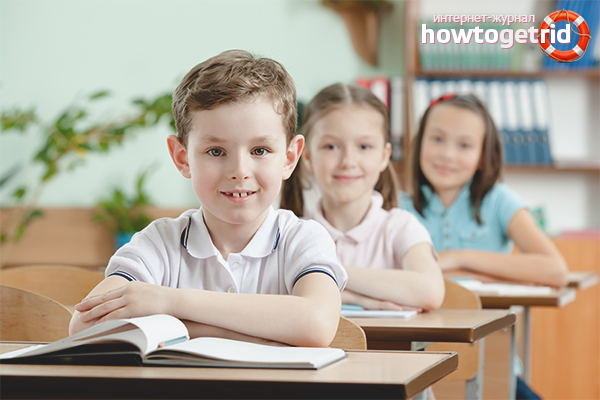
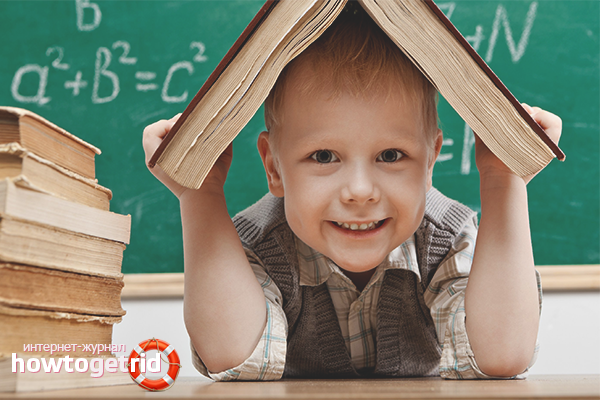



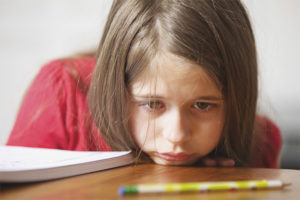

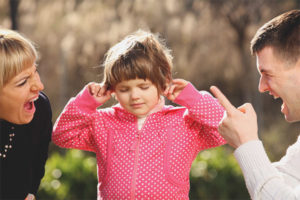

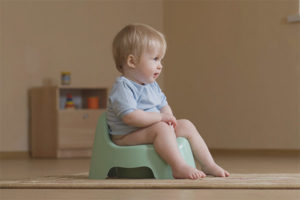
Submit